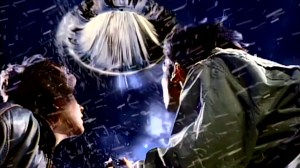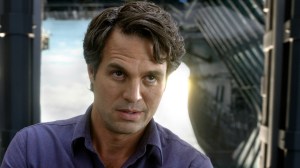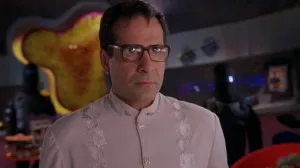
The Good Dinosaur is Pixar’s latest feature film offering hitting theaters over the Thanksgiving weekend. The story surrounds Arlo, a young dinosaur who befriends a wild human boy named Spot and together they learn what family really means. Following the success of Inside Out, Pixar has entered into a nice groove with The Good Dinosaur as the follow up.
Videos by ComicBook.com
Sam Elliott lends his iconic voice to Butch the leader of The Good Dinosaur’s t-rex family. He brings determination, wisdom, kindness and the cowboy jokes you were expecting to the movie in some of the most familiar tones from the genre.
Elliott sat down to talk about his shifting legacy on the Western front, what is truly unique about The Good Dinosaur and share some secrets about the process of voice acting.
As such an iconic actor in Westerns what has it been like to be a part of The Good Dinosaur that is introducing you to an entirely new generation of moviegoers?
Sam Elliott: It’s just another gift in a long list of gifts over a long haul. You know, I think anytime you get an opportunity to work with people that are at the top of their game – as Pixar clearly is – it’s just a blessing. I’m thrilled about it.
Has it been strange not meeting your fellow cast members until the movie is about to release?
Elliott: Yeah, yeah. It’s weird. If there’s any downside it’s like you get to work with people, but you don’t really get to work with them. It’s like we get to know each other and, then we’ll see each other at the premier.
Have you met everyone yet?
Elliott: No. I’ve met everybody that’s here today, but that’s not everyone that’s in the film, I don’t think. I don’t think everybody’s here. It’s a weird thing we do, you know, even making movies – [live action] movies – it’s like a band of gypsies. You go off and you make a movie and everybody gets really tight – particularly if it’s on a location where you’re, kind of, forced to hang together to have any kind of a life or friends or any company and, then you go home.
Did you incorporate any physicalization with your voice work?
Elliott: No, no. I just listen to Peter [Sohn]. I just wanted to please him. I’ve always felt that my job, as an actor, is to satisfy the director. He’s the captain on the ship, if you want to put it that way and I’m one of the guys on the crew. The great thing about Peter is that he was so specific in what he wanted and that makes our job really easy.
Was Peter the one reading cue lines when you recorded?
Elliott: No, there weren’t any cues. I didn’t even have that. I just had my lines. We’d run them and I’d do my lines a couple of times, or one at a time, or do three takes of the same line, but it was never like an exchange where I was talking to anybody. It’s a test. It’s a test in some way. That’s Peter’s brilliance.
Were you able to do any improvisation during your recording session?
Elliott: Mmm, no. My ad-libbing came in offering Peter different versions of what it was he was asking for. The hooting and the hollering and all that kind of stuff.
How many times did you record Butch’s roar?
Elliott: All I remember is that we did it at the end. I don’t think I did it that many times – three or four, maybe. I don’t like doing that to my voice. I just went for it. I gave it all I could give just a few times and it worked out.
When you approach a role that is strictly voice work how is your preparation different from a live action role?
Elliott: Yeah, it’s totally different and I don’t spend a lot of time doing it. The one thing I’ve learned in doing voiceover – whether it was for commercial purposes or whatever, where it’s just the voice – I find great value in doing it out loud, rather than just reading it. Doing it out loud. Particularly with voice work, it’s like hearing the sound of your own voice, when you go in there if you haven’t been doing it and all of a sudden you’re speaking into a microphone you’re really hearing it because you’re wearing a headset and it can be a little disarming at first, whereas, if you have done it aloud a number of times you’ll get it right off the bat. You don’t waste time getting it. You just do it
Do you think you’ll be emotional when you get a chance to see The Good Dinosaur? There were a lot of people crying at our screenings.
Elliott: I just think it’s a universal tale. We’re all going there. We’re all going to experience this kind of loss. We’re all gunna experience death. We all can respond to people’s embrace, whether it’s physical or intellectual or whatever. Mentors are mentors. If we’re lucky to cross paths with somebody in our life time to set us on a path or provoke us in some way that’s a great gift.
Butch is very much the mouthpiece for that message. He offers the most sage advice in the most upfront way possible. Does that leave you with a sense of responsibility to the audience?
Elliott: It makes me feel like I’m fortunate to be saying what I’m saying. You know?
Do you feel like bringing a Western story to the animated world is a logical step for the genre?
Elliott: That would seem to say that it’s over for live action film. I think it’s an incredible thing that it’s come into it ’cause I think that if this is an opportunity to instill some of those values – or to introduce those values – to a younger generation then, wow, that’s a wonderful thing.
The simplicity of the Western genre is something that always appealed to me. The good and bad thing, the black and white thing, the lack of grey are that we, you know, live in so much today. The love of the outdoors and, what I always thought were, those three key ingredients – the three struggles: man against man, man against the environment, man against himself. You know what I mean? Incredible and it still goes on.
—
We are all looking forward to watching Sam Elliott return to his Western ways and hope that you are too!








